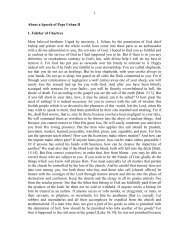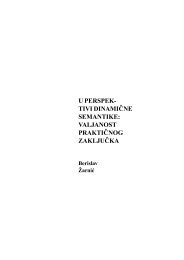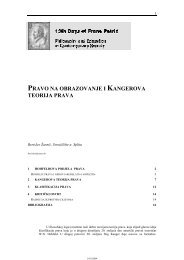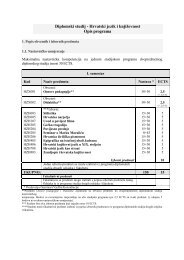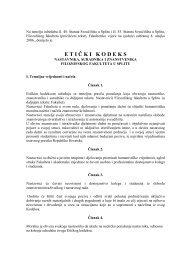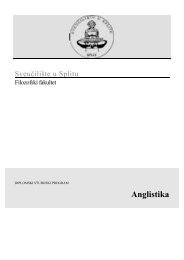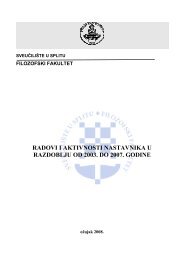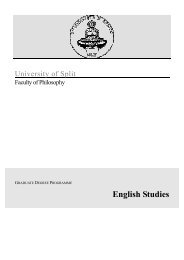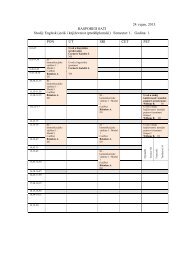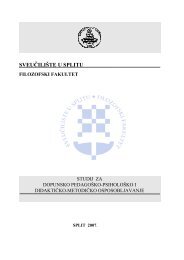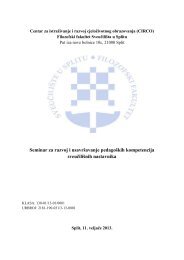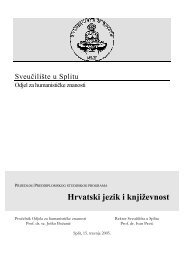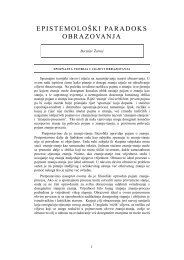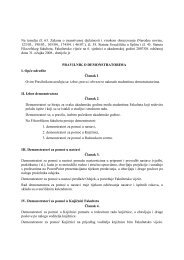Knjiga o nastavnicima - Filozofski fakultet u Splitu
Knjiga o nastavnicima - Filozofski fakultet u Splitu
Knjiga o nastavnicima - Filozofski fakultet u Splitu
Create successful ePaper yourself
Turn your PDF publications into a flip-book with our unique Google optimized e-Paper software.
Šime Pilić <strong>Knjiga</strong> o <strong>nastavnicima</strong><br />
18. Radojković, M. (1987.) Utopija o druženju u eri tehnike, Polja, Vol. XXXIII, No<br />
346, str. 533-535.<br />
19. Ritzer, G. (1997.) Suvremena sociologijska teorija, Nakladni zavod Globus,<br />
Zagreb.<br />
20. Supek, R. (1996.) Modernizam i postmodernizam: Proturječan čovjek kao<br />
utemeljenje: Ogled iz fundamentalne antropologije, Izdanja Antibarbarus, Zagreb.<br />
21. Štulhofer, A. (1990.) Prema teoriji "nevidljive zajednice", Revija za sociologiju,<br />
Vol. XXI, No 4, str. 729-743.<br />
22. Tadić, LJ. (1989.) O prijateljstvu i mržnji, Filozofija i društvo No 2, str. 277-287.<br />
23. Tomaš, A. (1998.) Poimanje prijateljstva i organizacija razrednog odjela, u: A.<br />
Peko i I. Vodopija (uredili) Vrjednovanje obrazovanja, Pedagoški <strong>fakultet</strong> Osijek,<br />
Osijek, str. 66-73.<br />
24. Ujević, T. (1979.) Pjesništvo I Odabrana djela T. Ujevića, knjiga prva (Priredio<br />
Šime Vučetić), "August Cesarec" i "Slovo ljubve" Zagreb i Beograd.<br />
25. Zvonarević, M. (1981.) Socijalna psihologija, Školska knjiga, Zagreb.<br />
PATTERS OF SOCIABILITY I IFORMATIO TECHOLOGY ERA<br />
(Example of teachers in society at the end of the 20th century)<br />
Summary<br />
The article deals with the research results on patterns of sociability, i.e.<br />
typology of friendship in Croatian society at the end of the 20th century. 954 teachers<br />
from primary and secondary schools in Dalmatia were interviewed. From the<br />
extensive questionnaire two questions are stressed: (1) education and (2) profession<br />
of teachers' friends.<br />
The results show that teachers' best friends belong to the upper educational<br />
stratum in four out of five cases. Majority of teachers (77%) was found to belong to<br />
three main patterns of sociability. The first type (43%) maintain friendship inside the<br />
circle of their profession, the second type (21%) maintain friendship with experts,<br />
while the third one (13%) maintain friendship with officers/clerks.<br />
The friendship between people with similar social status is partly confirmed.<br />
Friendship has been found to be primary human need (less than 2% of teachers have<br />
no friends). Teachers showed the largest social distance toward pupils, farmers and<br />
"taicuns".<br />
Key words: teachers, friendship, patterns of sociability, croatian society, best friends.<br />
108



